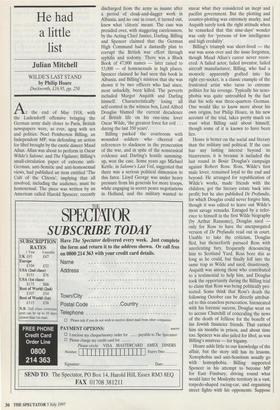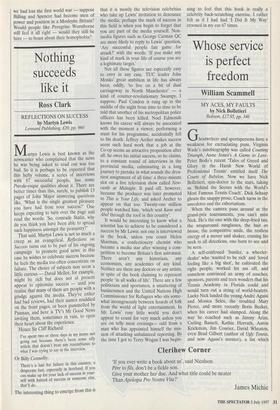He had a little list
Julian Mitchell
WILDE'S LAST STAND by Philip Hoare Duckworth, £16.95, pp. 250 At the end of May 1918, with the Ludendorff offensive bringing the German army daily closer to Paris, British newspapers were, as ever, agog with sex and politics. Noel Pemberton Billing, an Independent MP, was defending an action for libel brought by the exotic dancer Maud Allan. Allan was about to perform in Oscar Wilde's Salome, and The Vigilante; Billing's small-circulation paper of extreme anti- German, anti-Semitic and anti-homosexual views, had published an item entitled 'The Cult of the Clitoris', implying that all involved, including the audience, must be homosexual. The piece was written by an American called Harold Spencer, recently discharged from the army as insane after a period of cloak-and-dagger work in Albania, and no one in court, it turned out, knew what 'clitoris' meant. The case was presided over, with staggering carelessness, by the Acting Chief Justice, Darling. Billing and Spencer claimed that the German High Command had a dastardly plan to corrupt the British war effort through syphilis and sodomy. There was a Black Book of 47,000 names — later raised to 53,000 — of homosexuals in high places. Spencer claimed he had seen this book in Albania, and Billing's mistress that she was shown it by two officers who had since, most unluckily, been killed. The perverts included Margot Asquith and Darling himself. Characteristically losing all self-control in the witness box, Lord Alfred Douglas blamed the current decadence of British life on his one-time lover Oscar Wilde, 'the greatest force for evil . . . during the last 350 years'.
Billing packed the courtroom with wounded soldiers who cheered all references to slackness in the prosecution of the war, and in spite of the nonsensical evidence and Darling's hostile summing- up, won the case. Some years ago Michael Kettle, in Salome's Last Veil, suggested that there was a serious political dimension to this farce. Lloyd George was under heavy pressure from his generals for more troops, while engaging in secret peace negotiations in Holland, and the military wanted to smear what they considered an inept and pacifist government. But the plotting and counter-plotting was extremely murky, and Asquith surely took the right attitude when he remarked that this nine-days' wonder was only for 'persons of low intelligence and high credulity'.
Billing's triumph was short-lived — the war was soon over and the issue forgotten, though Maud Allan's career never recov- ered. A failed actor, failed inventor, failed aircraft manufacturer, Billing, who had a monocle apparently grafted into his right eye-socket, is a classic example of the frustrated artist who turns to extreme politics for his revenge. Typically his xeno- phobia was quite untroubled by the fact that his wife was three-quarters German. One would like to know more about his own origins, but Philip Hoare, in his new account of the trial, takes pretty much on trust what Billing said about himself, though some of it is known to have been lies.
Hoare is better on the social and literary than the military and political. If the case has any lasting interest beyond its bizarreness, it is because it included the last round in Bosie Douglas's campaign against Robert Ross. Ross, Wilde's first male lover, remained loyal to the end and beyond. He arranged for republication of Wilde's works, made friends with the children, got the literary estate back into profit; but he also published De Profundis, for which Douglas could never forgive him, though it was edited to leave out Wilde's most savage remarks. Enraged by a refer- ence to himself in the first Wilde biography (by Arthur Ransome), Douglas sued only for Ross to have the unexpurgated version of De Profundis read out in court. Unable to take the criticism, Douglas fled, but thenceforth pursued Ross with unrelenting fury, frequently denouncing him to Scotland Yard. Ross bore this as long as he could, but finally fell into the same trap as Wilde and sued, disastrously. Asquith was among those who contributed to a testimonial to help him, and Douglas took the opportunity during the Billing trial to claim that Ross was being politically pro- tected. Some think that Ross's death the following October can be directly attribut- ed to this ceaseless persecution. Intoxicated with his forensic success, Douglas went on to accuse Churchill of concealing the news of the death of Jellicoe for the benefit of his Jewish financier friends. That earned him six months in prison, and about time too. Spencer was also jailed for libel, as was Billing's mistress — for bigamy.
Hoare adds little to our knowledge of the affair, but the story still has its lessons. Xenophobia and anti-Semitism usually go with homophobia. Billing supported Spencer in his attempt to become MP for East Finsbury, driving round what would later be Mosleyite territory in a vast, torpedo-shaped racing-car, and organising street fights with his opponents. Suppose we had lost the first world war — suppose Billing and Spencer had become men of power and position in a Mosleyite Britain? Would people like Peregrine Worsthorne still feel it all right — would they still be here — to boast about their homophobia?



























































 Previous page
Previous page